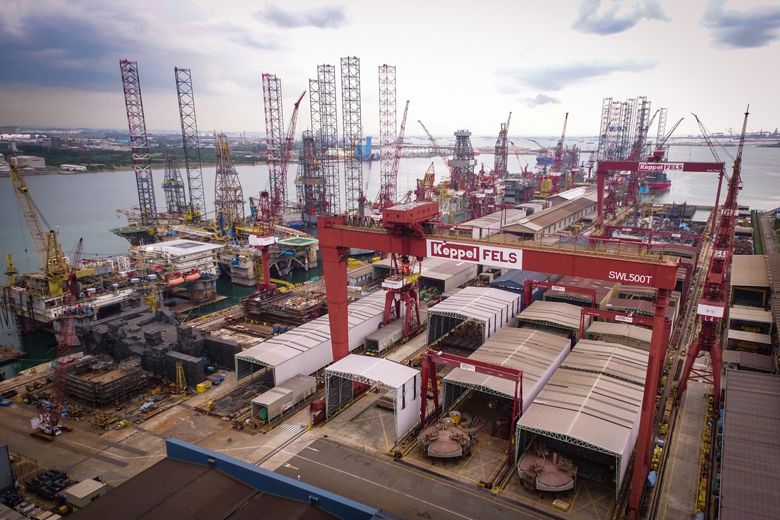Ahead of the 26th United Nations Climate Change Conference of the Parties (COP26) to be held in Glasgow, United Kingdom in November, Keppel Corporation Limited (Keppel) announced today its commitment to halve the Company’s Scope 1 and 2 carbon emissions by 2030, compared to 2020 levels, and achieve net zero by 2050. The target is in line with the Paris Agreement’s goal to limit global temperature increase to 1.5°C compared to pre-industrial levels.

Mr Loh Chin Hua, CEO of Keppel Corporation, said, “Climate change is one of the biggest threats of our time, and urgent action must be taken to limit global warming. This requires transformational change across industries, governments, and society as a whole. As part of Vision 2030, Keppel has put sustainability at the core of our strategy. The target of halving our carbon emissions by 2030 and achieving net zero by 2050 reflects our commitment to environmental sustainability and climate action. Beyond reducing the environmental impact of our operations, Keppel is also making sustainability our business by providing diverse solutions that contribute to a cleaner and greener world and to combatting climate change, such as renewables, green buildings and data centres, climate-resilient nearshore developments and various decarbonisation solutions.”
Based on Keppel’s current portfolio, under the new target, the Company would reduce its Scope 1 and 2 emissions from approximately 172,000 tCO2e in 2020 to 86,000 tCO2e by 2030[1]. Beyond 2030, Keppel aims to achieve net zero Scope 1 and 2 carbon emissions by 2050. Apart from Scope 1 and 2 emissions, Keppel has been tracking Scope 3 emissions since 2019, starting with business travel and investments. The Group is progressively expanding its tracking of Scope 3 emissions, and will work with its supply chain and portfolio of investments to improve energy efficiency and reduce emissions wherever possible.
Climate Action Roadmap
Keppel will work closely with its different stakeholders to achieve its carbon emissions reduction goals and contribute to global decarbonisation efforts, including through the following measures:
- Refocusing its portfolio on sustainable urbanisation solutions, and progressively pivoting away from more carbon intensive businesses.
- Purchasing and using renewable energy where possible to reduce Scope 2 emissions, as has been done at Keppel Bay Tower, which is Singapore’s first Green Mark Platinum (Zero Energy) commercial building.
- Lowering emissions intensity of the Group’s infrastructure assets.
- Greening its properties. All of Keppel Land’s new Singapore developments and overseas commercial projects will be certified to the BCA Green Mark GoldPLUS standard, or its equivalent.
- Reducing the carbon footprint of its data centres. Keppel Data Centres will tap renewable energy where possible and work with its customers to reduce the emissions of their data centre operations.
- Investing in clean, new businesses such as solar farms, distributed energy resources and storage, and electric vehicle charging infrastructure. Keppel has set a target to grow its portfolio of renewable energy assets to 7GW by 2030.
- Greening urban cooling through the design and development of energy-efficient district-level and large-scale centralised cooling systems.
- Advancing the circular economy through Keppel’s waste-to-energy technology for non-recyclable waste, the recovery of waste treatment residues and recycling of used water (NEWater).
- Investing in sustainability-related innovation such as carbon capture, utilisation and sequestration, and collaborating with partners to develop clean energy solutions such as low-carbon hydrogen supply. Keppel has set a target to invest at least 50% of its research and development expenditure on sustainability-linked innovation by 2030.
On top of the Group-wide carbon emissions reduction target, Keppel’s business units will be encouraged to pursue even higher standards wherever possible, in line with their respective sectoral contexts and unique capabilities. For example, Keppel Land and M1 are working towards setting GHG emission reduction targets in accordance with the Science-Based Targets Initiative (SBTi). Keppel Land plans to achieve 100% reduction for Scope 1 and 2 emissions by 2030, while M1 will adopt the Information and Communication Technology (ICT) Sector Guidance to set its science-based emissions reduction targets in line with the 1.5oC pathway. In addition, Keppel Data Centres aims to achieve net zero Scope 1 and 2 emissions for all its new data centre assets in Singapore by 2030. Further announcements will be made by the respective business units in due course.
Keppel supports the Taskforce on Climate-related Financial Disclosures (TCFD) and has started implementing its recommendations, including enhancing the Company’s understanding of climate-related risks and opportunities faced by the Group. Earlier this year, Keppel completed a high-level evaluation of the physical climate risks facing 50 of its key assets globally and will be looking into possible adaptation measures to be taken by the different business units, where necessary. Since 2020, Keppel has adopted an evolutionary shadow carbon pricing scheme to evaluate major investment decisions, in order to mitigate mid-to-long term climate-related risks, prepare for tougher climate legislation and higher carbon prices, and avoid stranded assets.
To embed sustainability throughout the Company and ensure accountability, environmental sustainability targets have been included in the performance appraisal of senior management across the Group, including both annual remuneration and long-term incentives. The Group also plans to leverage its green credentials and sustainability efforts to tap green and sustainability-linked financing to support new investments. Since 2019, the Group has collectively secured close to $2 billion in green and sustainability-linked financing facilities.